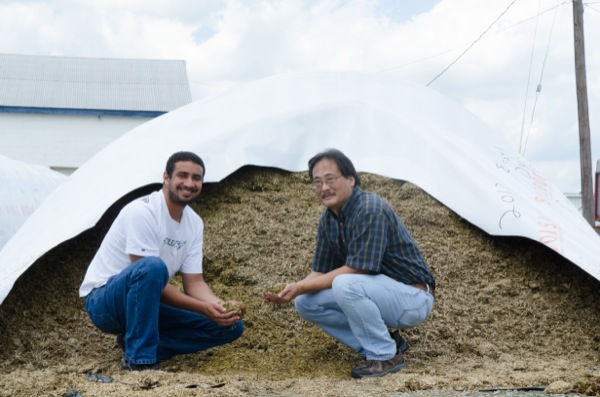
Bridge to Brazil
UD's Kung teaches silage to Brazilian professors, students
10:30 a.m., June 24, 2013--For the past 14 years, Limin Kung has served as a bridge between the University of Delaware and various universities in Brazil, linking with more than 20 students and professors from the South American nation through his expertise in the agricultural practice known as silage.
Kung, the S. Hallock du Pont Professor in the Department of Animal and Food Sciences, has had students and faculty members come to UD from three Brazilian universities: Escola Superior de Agricultura Luiz de Queiroz (ESALQ), which is a unit of the University of São Paulo; the Universidade Estadual Paulista Júlio de Mesquita Filho (UNESP)-São Paulo State University; and the Universidade Federal de Viçosa (UFV).
Global Stories
Fulbright awards
Peace Corps plans
The professors and students all came to UD as part of sabbaticals, undergraduate internships or through the Brazilian “sandwich” program, established between universities in the United States and Brazil in which Brazilian Ph.D. students spend one year studying at an American institution sandwiched between their studies at home.
Two students, Renato Schmidt and Mateus Santos, obtained their doctorates while working with Kung through UD-funded grants.
Kung is one of the leading experts on silage in the U.S. and internationally and because of the considerable interest in silage fermentation around the world, he said it made sense to have Brazilian students study with him to learn more about the topic.
Silage is plant material that has undergone anaerobic fermentation, a process similar to the one used when making pickles or sauerkraut, in order to store it properly.
According to Kung, “silage-making started off in temperate climates where people didn’t have the ability to graze during cold weather or they didn’t have the ability to harvest crops all year-round. They wanted to find some way to say, ‘At certain times of the year, I have really high quality stuff here -- how can I preserve that and store it when it is at its best and use it as feed year-round?’”
The students who studied with Kung in his laboratory were able to get experience learning about silage on the UD farm in Newark, where they helped Kung with various research studies.
“The type of work that we do with silage, you need lots of people,” Kung said. “There is lots of hands-on activity and it is very labor intensive in the field and in the lab.”
Kung explained that they study silage both before and after they put it in the silo in order to make sure that everything is OK.
“We know what goes in and we try to control what comes out,” he said. “The way that we try to control what comes out is basically to have good management first, which means we have the right moisture and the right packing density. Also, we work on trying to find new types of additives -- whether they be chemical or enzymatic or microbial -- to improve the process. A huge area of worldwide research is trying to develop different types of additives to make the process better.”
Still, Kung said that silage is not the only reason that the Brazilian students come to UD. “They basically all want to learn more about silage but they’re here for a number of reasons,” he said. “For one, the internships are important for them to experience a different culture, so that they can improve their English speaking skills and then also to do some research. They’re here for the cultural and the scientific experience.”
Kung is also part of a recent grant with Odilon Pereira, a professor at UFV who spent a one-year sabbatical in Kung’s lab at UD. Pereira is linked to the Science Without Borders program and the Coordenação de Aperfeiçoamento de Pessoal de Nível Superior (CAPES), the Brazilian Federal Agency for the Support and Evaluation of Graduate Education, which will involve him teaching silage classes to graduate students as well as conducting seminars and meeting with project coordinators in Brazil.
Article by Adam Thomas
Photo by Danielle Quigley








